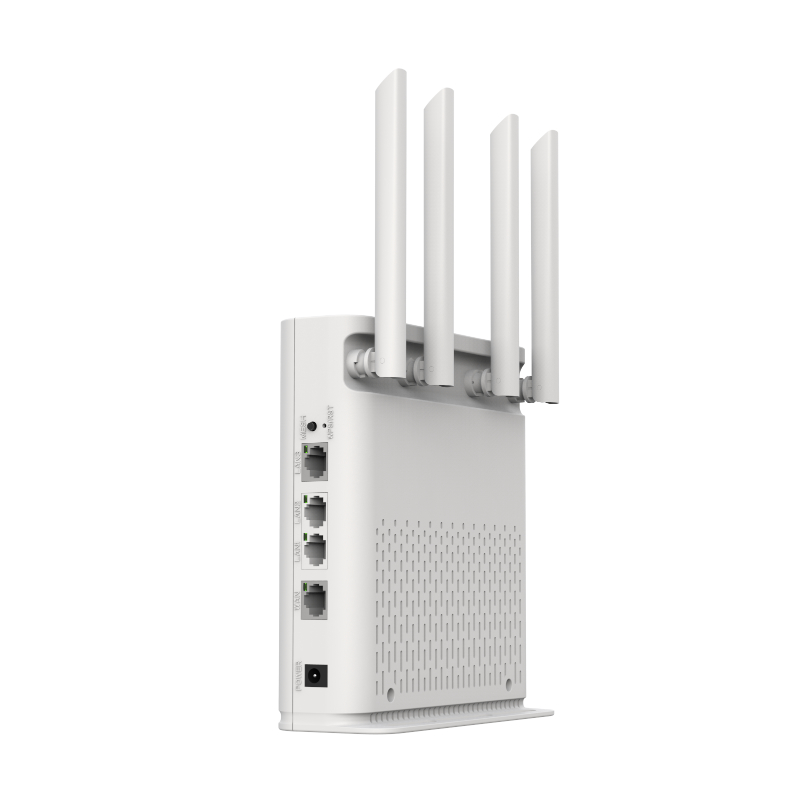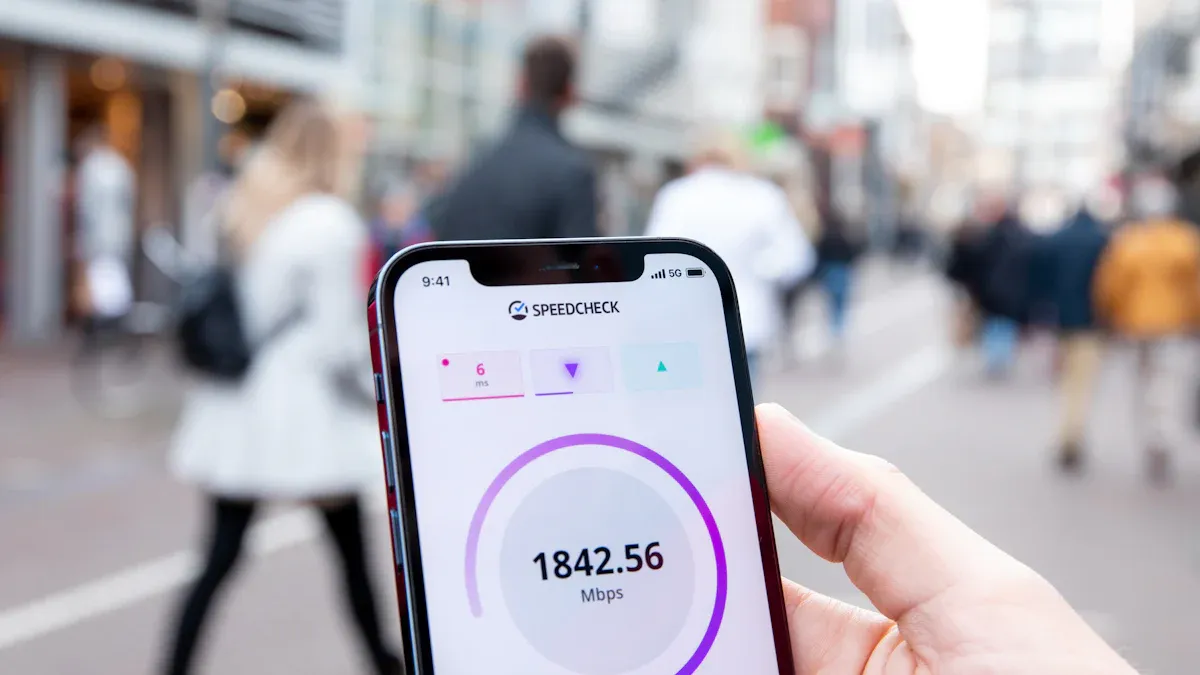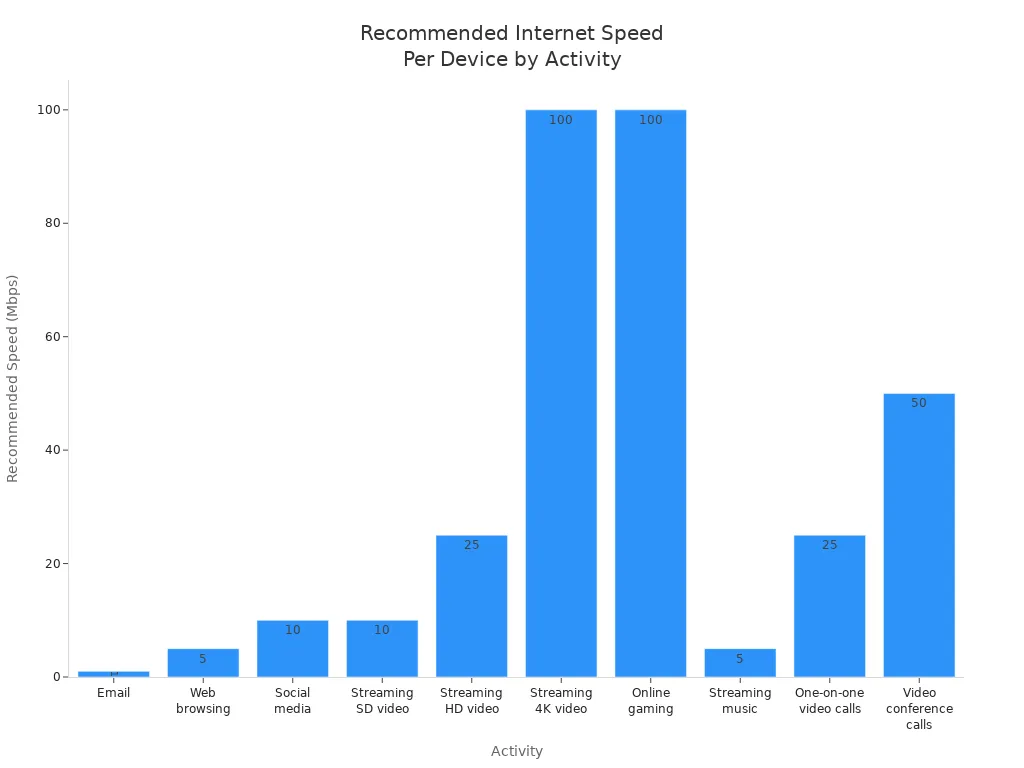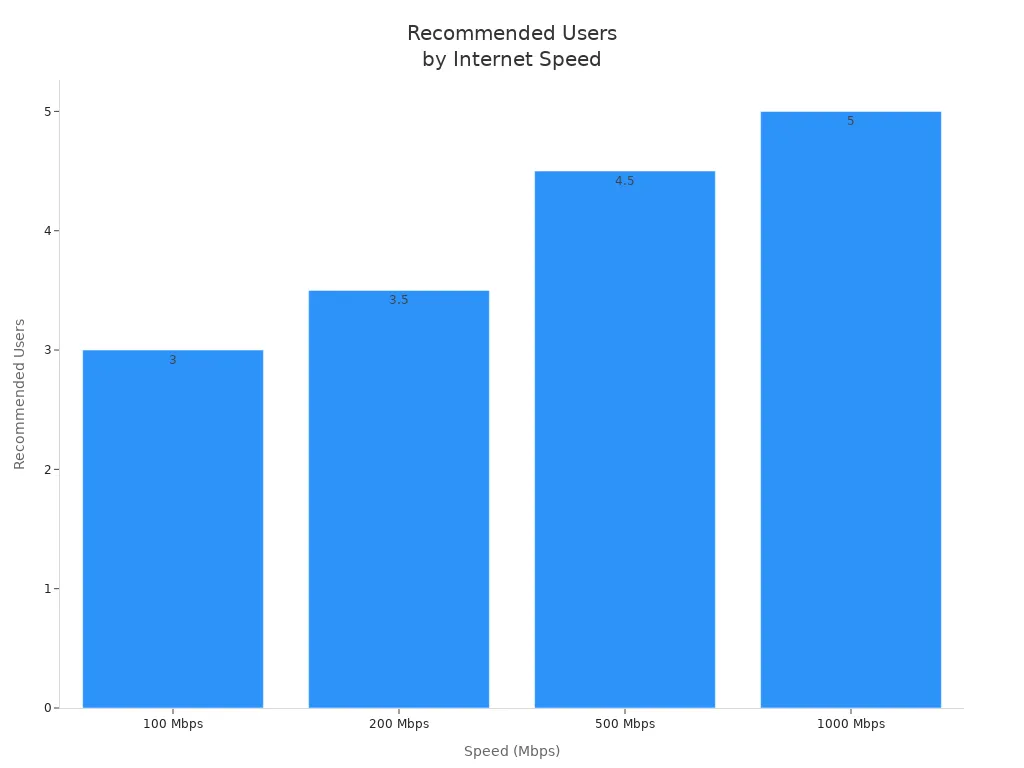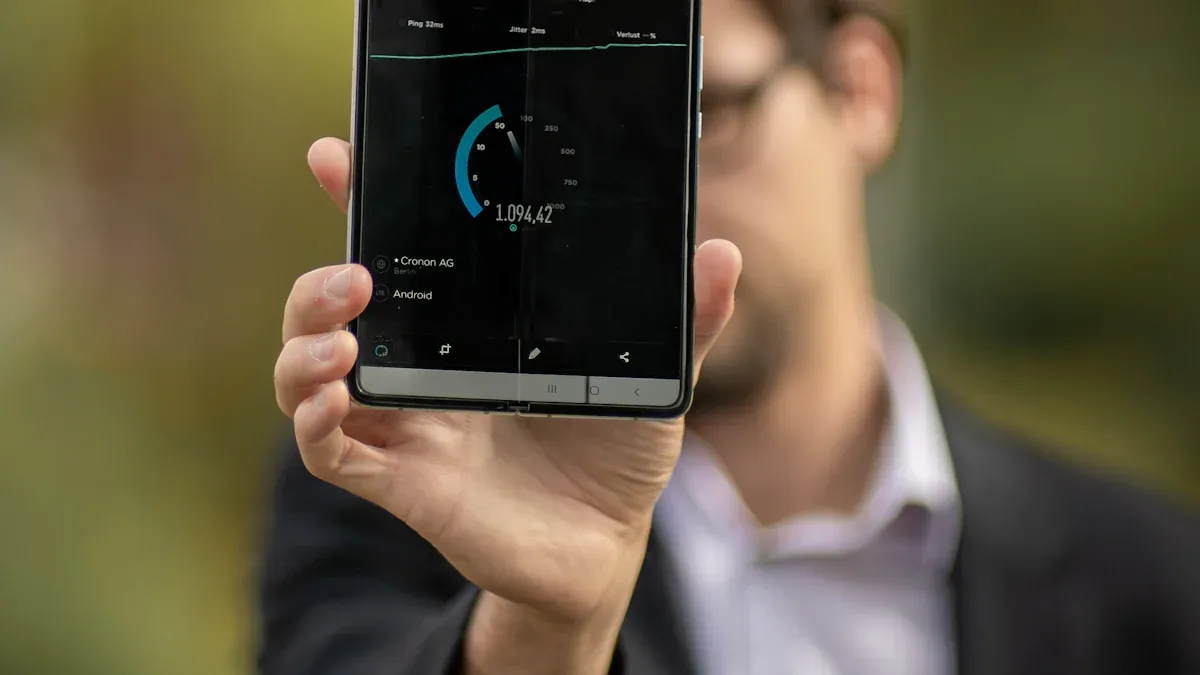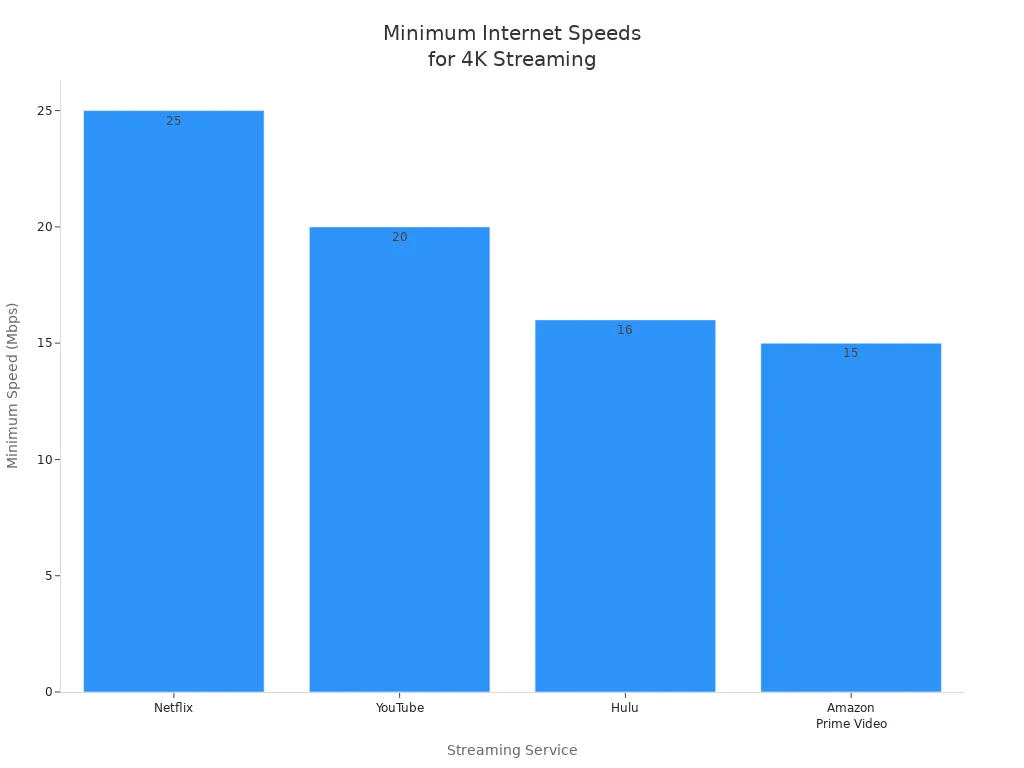You might wonder, is 300 mbps fast for your home? The answer is yes—300 mbps internet gives you a fast internet speed that most households enjoy. In 2024, the average internet speed in the United States is 214Mbps, so you get much more than a good internet speed with 300 mbps. You can stream several 4K movies, play online games, and join video calls at the same time. You should think about your household size and how many devices you use before choosing the right plan.
Key Takeaways
300 Mbps is a fast internet speed. It is faster than the average U.S. speed of 214 Mbps. This speed lets many people stream 4K videos at once. You can also play online games and join video calls together. There is no lag when you do these things at the same time. With 300 Mbps, you can use many devices at once. This makes it great for busy homes. Streaming services need 15-25 Mbps for 4K shows. So, 300 Mbps can handle many streams at once. For online gaming, 300 Mbps gives a smooth experience. You can play, download, and stream with no stops. If your home has many smart devices, 300 Mbps can support them. Your connection will not slow down. To get the most from 300 Mbps, upgrade your router. You should also set up your Wi-Fi the right way. As smart home tech grows, 300 Mbps will still be enough. It will support new devices and activities for most families.
Is 300 Mbps Fast?
When you ask, "is 300 mbps fast," you want to know if this internet speed can keep up with your daily needs. The answer is yes. Most experts and organizations agree that 300 mbps is a fast speed for home use. You can enjoy smooth streaming, gaming, and video calls, even with several devices online at once.
What 300 Mbps Internet Can Handle
Streaming and Gaming
You might wonder if 300 mbps internet is enough for your favorite activities. The Federal Communications Commission (FCC) sets the standard for fast internet speed at 100 Mbps download and 20 Mbps upload. With 300 mbps, you get three times the minimum download speed for a fast connection.
Organization | Minimum Download Speed | Minimum Upload Speed |
FCC | 100 Mbps | 20 Mbps |
Previous FCC | 25 Mbps | 3 Mbps |
When you stream movies or play games, you need a certain amount of bandwidth. For example, streaming 4K video uses up to 25 Mbps per stream. Online gaming usually needs 3 to 6 Mbps. Video conferencing works well with at least 100 Mbps for the best quality. With 300 mbps, you can do all these things at the same time without slowdowns.
Activity | Minimum Speed Required | 300 Mbps Sufficiency |
4K Streaming | Up to 25 Mbps | Sufficient |
Online Gaming | At least 3-6 Mbps | Sufficient |
Video Conferencing | At least 100 Mbps | Sufficient |
You can stream several 4K movies, play online games, and join video calls all at once. You will not see buffering or lag. This makes 300 mbps a good speed for modern households.
Video Calls and Remote Work
If you work or study from home, you need a reliable connection. Video calls and remote work use about 1 to 6 Mbps per call. Even if your family has multiple people on video calls, 300 mbps can handle it. You can download large files, upload homework, and join meetings without waiting.
Activity | Bandwidth Requirement |
Gaming | Varies, up to 300 Mbps for many devices |
Streaming (4K) | 25 Mbps per stream |
Video Conferencing | 1-6 Mbps per call |
Remote Work | 1-6 Mbps per call |
Smart Home Devices | 15 Mbps per 4K camera |
Multiple Devices Support
You may have many devices in your home. Phones, tablets, laptops, smart TVs, and even smart home cameras all use your internet speed. Is 300 mbps fast enough for all these devices? Yes, it is. You can connect several devices and still enjoy a smooth experience.
A 300 mbps connection can support multiple high-definition streams and gaming activities at the same time.
It is suitable for busy households, allowing for activities like cloud gaming, video calls, and file sharing without performance drops.
Most families find that 300 mbps meets their needs for a good internet speed.
You can see how much speed each activity needs in the table below:
Activity | Minimum Speed | Recommended Speed |
Email | 1 Mbps | 1 Mbps |
Web browsing | 3 Mbps | 5 Mbps |
Social media | 3 Mbps | 10 Mbps |
Streaming SD video | 3 Mbps | 10 Mbps |
Streaming HD video | 5 Mbps | 25 Mbps |
Streaming 4K video | 25 Mbps | 100 Mbps |
Online gaming | 5 Mbps | 100 Mbps |
Streaming music | 1 Mbps | 5 Mbps |
One-on-one video calls | 1 Mbps | 25 Mbps |
Video conference calls | 2 Mbps | 50 Mbps |
If you have three people in your home, you should aim for at least 100 Mbps total. With 300 mbps, you can support three to five people, each using several devices, without any trouble. You can stream HD video, play games, and join video calls all at once.
Tip: If you want a good internet speed for your family, 300 mbps gives you plenty of room for everyone to enjoy their favorite online activities.
Is 300 mbps fast? Yes, it is more than enough for most homes. You get a fast, reliable connection that supports all your devices and activities.
Fast Internet Speed for Households
Small vs Large Households
You want your internet speed to match your household size. In a small household, you might have two or three people. Each person may use a phone, a laptop, and a smart TV. With 300 mbps internet, you can stream, play games, and join video calls at the same time. You will not notice slowdowns, even if everyone uses the internet at once.
In a large household, you may have five or more people. Each person could use several devices. You might also have smart home gadgets, security cameras, or even a home office. During busy times, everyone may want to stream or download files. In these cases, your internet speed needs to keep up with all the activity.
Here is a simple table to show how 300 mbps internet speed works for different household sizes:
Household Size | Recommended Speed | Performance Notes |
Small Households | 300 Mbps | Suitable for multiple users without significant slowdowns |
Large Households | >300 Mbps | May require higher speeds to avoid slowdowns during peak usage |
Note: If you have a small household, 300 mbps gives you a good speed for all your needs. In a large household, you may want to consider a faster plan if you notice slowdowns.
Device and User Count
You should think about how many devices you use every day. Phones, tablets, laptops, smart TVs, and gaming consoles all need internet speed to work well. If you have a family of four, each person may use two or three devices. That means your home could have ten or more devices online at once.
A good internet speed lets you stream movies, play games, and join video calls without lag. With 300 mbps internet, you can support many devices at the same time. Most homes find this speed more than enough for daily use.
Here are some examples of what you can do with 300 mbps:
Stream several 4K movies at once
Play online games on multiple consoles
Join video calls from different rooms
Download large files quickly
If you have many smart home devices, like cameras or smart speakers, you will also need a strong internet speed. Each device uses a small amount of bandwidth, but together they can add up. 300 mbps internet speed gives you plenty of room for all your devices.
Tip: Count your devices and think about how often you use them at the same time. If you notice slowdowns, you may need to upgrade your plan. For most families, 300 mbps is a good internet speed that supports everyone’s needs.
300 Mbps Internet vs Other Speeds
100 Mbps vs 300 Mbps
When you compare 100 Mbps and 300 Mbps, you see a big difference in what each plan can handle. With 100 Mbps, you get a peak download speed of 12.5 MB/s. This speed works well for one or two people who stream HD videos, browse the web, or play light online games. If your home has more people or you want to stream 4K content, 300 Mbps gives you a much better experience. You get a peak download speed of 37.5 MB/s, which supports three to five people. You can stream 4K videos, play online games, work from home, and connect smart devices all at once.
Plan Speed | Peak Download (MB/s) | Ideal Household Size | Key Uses |
100 Mbps | 12.5 | 1–2 people | HD streaming, browsing, light gaming |
300 Mbps | 37.5 | 3–5 people | 4K streaming, online gaming, remote work, smart devices |
Tip: If your family uses many devices or streams in 4K, 300 Mbps will give you a smoother internet speed.
300 Mbps vs 500 Mbps and 1 Gbps
You may wonder if you need even more speed. For most medium-sized households, 300 Mbps handles multiple HD streams, remote work, and smart home devices. If you have more people or want to do more at once, 500 Mbps gives you extra room for more activities. Large households with five or more people may choose 1 Gbps for the best performance. This speed supports heavy users, seamless gaming, and many smart devices.
Internet Speed | Suitable For | Performance Highlights |
300 Mbps | Medium households (3-5) | Handles multiple HD streams, supports remote work, smart home devices |
500 Mbps | Medium households (3-5) | Better for more simultaneous activities |
1 Gbps | Large households (5+) | Perfect for heavy users, superior gaming, enhanced remote work, smart home |
You can see how the number of users matches each internet speed in the chart below:
Best Internet Speed for Your Needs
Choosing the best internet speed depends on your household size, the number of devices, and your online activities. If you have two to four users, 100 Mbps or 200 Mbps may be enough for HD streaming and video calls. For three to six users, 300 Mbps or 500 Mbps supports gaming, multiple streams, and smart devices. If your home has five or more users or many connected devices, 1 Gbps is a strong choice.
Speed (Mbps) | Recommended Users | Activities Supported |
100 | 2 to 4 | Streaming HD video, video conferencing |
200 | 2 to 5 | Streaming live HD video, online gaming |
500 | 3 to 6 | Competitive online gaming, multiple HD streams |
1000 | 5+ | Competitive gaming on multiple devices |
You should also think about the type of internet connection you can get in your area. Fiber and cable often offer higher speeds. LB-LINK routers help you get the most from your plan, making sure every device in your home gets a strong signal.
Note: In 2025, many families will need enough internet speed to support all activities at once. Smaller homes may do well with 200 Mbps, but larger homes or those with many devices may need 500 Mbps or more to avoid slowdowns.
If you want a reliable and fast connection, look at your household needs and choose the plan that fits best. LB-LINK can help you find the right equipment for your home.
Internet Speed for Streaming and Gaming
4K Streaming Requirements
You want to watch movies and shows in 4K quality. You need a strong internet speed to stream without buffering. Most streaming platforms set clear requirements for 4K video. Netflix asks for at least 25 Mbps. YouTube recommends 20 to 25 Mbps. Hulu and Amazon Prime Video need 15 to 16 Mbps. If you have 300 Mbps, you can stream several 4K videos at the same time. You will not see interruptions, even if your family watches different shows.
| Streaming Service --- Minimum Speed (Mbps) --- Recommended Speed (Mbps) | | --- --- --- | | Netflix --- 25 --- 25 | | YouTube --- 20 --- 25 | | Hulu --- 16 --- N/A | | Amazon Prime Video --- 15 --- N/A |
Tip: You can stream up to ten 4K videos at once with 300 Mbps. This makes it a good internet speed for families who love movies.
Online Gaming Experience
You want smooth gameplay when you play online games. You need a reliable internet speed and low latency. Most games work well with 50 to 100 Mbps. Cloud gaming needs at least 35 Mbps for a stable experience. If you have multiple gamers in your home, aim for at least 200 Mbps. With 300 Mbps, you can play, download updates, and stream your gameplay without lag.
For cloud gaming, you need a download speed for gaming of at least 15 to 25 Mbps for 1080p resolution.
You also need an upload speed for gaming of at least 3 Mbps.
Most multiplayer games run best with 50 to 100 Mbps.
Households with several gamers should look for 200 Mbps or more.
Latency matters for gaming. You want a ping time under 40 ms for real-time action. If your latency goes above 100 ms, you may notice delays.
| Latency Range --- Description | | --- --- | | 20–40 ms --- Optimal for smooth, real-time gameplay | | Under 100 ms --- Playable, but may introduce some lag | | Over 100 ms --- Noticeable delays that disrupt gameplay |
Note: You get a great online gaming experience with 300 Mbps. You can play, stream, and chat with friends at the same time.
You see that 300 Mbps is more than enough for streaming and gaming. You can enjoy movies in 4K and play games without slowdowns. This internet speed supports many devices and users at once.
Maximizing Your 300 Mbps Internet
You want to get the most from your 300 Mbps internet speed. A few simple steps can help you enjoy a stable connection and strong speed throughout your home. Let’s look at how you can optimize your Wi-Fi, upgrade your router, and fix slow speeds.
Wi-Fi Optimization
Your Wi-Fi setup plays a big role in how well your internet speed works. If you notice slowdowns, try these tips to boost your connection:
Restart your modem and router to clear any glitches.
Update your router’s firmware for better performance and security.
Switch between 2.4GHz and 5GHz Wi-Fi bands to find the best signal.
Change your Wi-Fi channel to avoid interference from neighbors.
Adjust your router’s antennas for better coverage.
Remove unused devices from your network.
Check your device settings to make sure they use the fastest connection.
Place your router in a central, high spot in your home.
Use Wi-Fi extenders if you have dead zones.
Replace old equipment if it cannot handle high speed broadband.
Tip: A good internet speed depends on both your plan and your home setup. Small changes can make a big difference.
Router Upgrades (LB-LINK)
A modern router helps you get the best out of your 300 Mbps plan. LB-LINK routers offer features that boost your internet experience. Here is what you get with an LB-LINK router:
Feature | Description |
High-gain antennas | Four 5dBi antennas cover up to 5000 sq ft for a stable connection. |
Security protection | Built-in anti-virus and anti-hacking features keep your network safe. |
Maximum user connections | Supports up to 64 devices at once, perfect for busy homes. |
Wireless speed and range | Meets IEEE802.11n standards for up to 6X speed and 4X range. |
Fast internet speeds | Delivers a 300 Mbps wireless rate for smooth gaming and downloads. |
Stronger penetration | External antennas help signals reach every room, even through walls. |
You can enjoy a good internet speed on all your devices with the right router. LB-LINK routers help you keep a stable connection, even when many people use the internet at the same time.
Troubleshooting Slow Speeds
Sometimes, your internet speed may feel slower than expected. Here are common reasons and how you can fix them:
Streaming or downloading large files can use up bandwidth. Limit these activities or upgrade your plan if needed.
A weak Wi-Fi signal can happen if your router sits far from your devices or behind walls. Move your router to a better spot.
Some internet plans have data caps. Check your plan and manage your usage to avoid slowdowns.
Too many devices can slow your network. Change your Wi-Fi password to remove old devices or manage them through your router.
Outdated devices may not support high speed broadband. Update your devices and software for better performance.
Note: Regular checks and small changes help you keep a strong speed and a stable connection in your home.
Is 300 Mbps Enough for the Future?
Smart Home Growth
You may notice more smart devices in homes every year. Smart speakers, cameras, lights, and thermostats are becoming common. Over the next five years, the number of households with smart devices will rise quickly. Take a look at the growth:
Year | Active Households (millions) | Household Penetration Rate (%) |
2022 | 43.8 | 14.2 |
2027 | 93.59 | 28.8 |
Smart speakers are growing even faster:
Year | Households with Smart Speakers (millions) | Projected Growth Rate (%) |
2022 | 130 | - |
2027 | 335 | 157.7 |
You can see that smart home technology is not just a trend. It is becoming a normal part of daily life. As more devices connect, you might worry about your network. Most smart home devices use very little bandwidth. Even as you add more, a 300 Mbps plan will likely stay strong enough for your needs.
Note: The main challenge comes from many devices sharing your Wi-Fi, not from each device using a lot of data. You should focus on a good router and strong Wi-Fi coverage.
Future-Proofing Your Network
You want your home network to last as technology changes. You can take steps now to make sure your setup stays ready for new devices and faster speeds. Here are some best practices:
Best Practice | Description |
Running Tubes (Conduits) for Future Cabling | Install tubes from your network closet to key rooms. This makes it easy to upgrade cables later. |
Preparing for Future Technologies: Wi-Fi 7 | Plan for new Wi-Fi standards. This helps your network handle faster speeds in the future. |
Understanding Cabling Options: Cat6 and Fiber | Use Cat6 or fiber optic cables. These support high speeds and keep your network reliable. |
The Importance of Structured Cabling | Structured cabling gives your network a strong backbone. This helps as you add more devices. |
You can also choose equipment that grows with your needs. LB-LINK routers help you future-proof your network in several ways:
Support for Wi-Fi 6, which works well with many devices and streaming.
Mesh networking lets you add more nodes for better coverage as your home grows.
AI-driven optimization adapts to your usage and keeps your network running smoothly.
Easy expansion for larger homes or more devices.
Wi-Fi 6 is a great choice today. It handles many devices and streaming at once. Wi-Fi 7 is coming soon and will support even faster speeds and more smart home features. LB-LINK routers make it simple to upgrade when you are ready.
Tip: If you plan ahead and use the right equipment, your 300 Mbps internet speed will serve you well for years. You can enjoy new smart home devices and fast connections without worry.
You get a fast internet speed with 300 Mbps. This plan supports streaming, gaming, and remote work for most families. Many users feel satisfied because they can use many devices at once. If you notice slow speeds, buffering, or Wi-Fi dead zones, your home may need more bandwidth. Check the table below to see how device use adds up:
Device Type | Bandwidth Requirement (Mbps) |
Streaming Video | 3-25 |
Online Gaming | 3-6 |
Video Calls | 1-4 |
Smart Home Devices | 1-5 |
Total for Multiple Devices | 300-500+ |
Think about your household size and activities. For the best experience, choose a strong router like LB-LINK.
FAQ
Is 300 Mbps enough for a family of four?
You can support a family of four with 300 Mbps. Everyone can stream, play games, and join video calls at the same time. You will not see slowdowns.
How many devices can use 300 Mbps at once?
You can connect 20 or more devices with 300 Mbps. Phones, laptops, smart TVs, and cameras all work smoothly. You get fast speeds for each device.
Can you stream multiple 4K videos with 300 Mbps?
You can stream up to ten 4K videos at once with 300 Mbps. Each stream uses about 25 Mbps. Your family can watch different shows without buffering.
Do you need a special router for 300 Mbps?
You need a modern router to get the full speed. LB-LINK routers support 300 Mbps and help you cover your whole home. Old routers may slow your connection.
Is 300 Mbps good for online gaming?
You get a great gaming experience with 300 Mbps. You can play, download updates, and stream gameplay. Low latency keeps your games smooth.
Will 300 Mbps be enough as you add smart home devices?
You can add many smart home devices with 300 Mbps. Most use little bandwidth. You should focus on a strong Wi-Fi signal for the best results.
What is the difference between Mbps and MB/s?
Mbps means megabits per second. MB/s means megabytes per second. You get MB/s by dividing Mbps by 8. For example, 300 Mbps equals 37.5 MB/s.
Can you upgrade to faster speeds later?
You can upgrade your plan if you need more speed. Many providers offer 500 Mbps or 1 Gbps. LB-LINK routers make upgrading easy.









